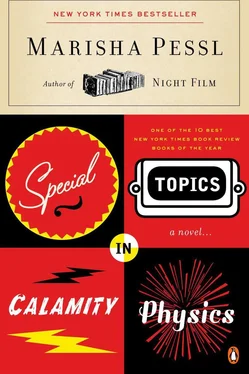“Okay. Call me when you get a chance. I’m at home. But you can reach me on my mobile if I go out. I might go out. I need eggs. On the other hand, I might stay home and make tacos. Okay. Forget this message. Speak to you soon.”
In a seemingly astute statement Socrates wrote, “The hottest love has the coldest end.” By these words, by their very definition — because I’m sure Dad never lied to them, never pretended his affections were anything not perfectly encapsulated by the words lackadaisical and lukewarm —every one of Dad’s ends should have been a sun-drenched, rosy affair. They should have been polo matches. They should have been picnics.
I don’t think Dad ever quite understood it himself, treating these sobs as he did, with a muddle of embarrassment and regret. When he came home that night, he did what he always did. He played the messages (turning down the volume when he realized who it was) and deleted them.
“Have you eaten, Christabel?” he asked.
He knew I’d heard her messages, but like Emperor Claudius in 54 A.D. upon hearing the thrum of Roman rumor that his dear wife, Agrippina, was plotting to poison him with a dish of mushrooms presented to him by his favorite eunuch, for some unknown reason, Dad chose to ignore these signs of impending doom (see Lives of the Caesars , Suetonius, 121 A.D.).
He never learned.
Two weeks later, the Saturday night of Maxwell’s Christmas Cabaret, I was being unlawfully detained at Zach Soderberg’s house. I was wearing one of Jefferson Whitestone’s old black cocktail dresses, which Jade claimed Valentino himself had designed specifically for her, though when they feuded for the affections of “a shirtless bartender at Studio 54 named Gibb,” she’d furiously ripped out the label, leaving the dress an amnesiac. (“This is how empires fall,” Jade had said, sighing dramatically as she and Leulah pinned the armholes and waist so the thing no longer fit like a life jacket. “Trust me. You start breeding with the nimrods and that’s the end of your civilization. But I suppose you couldn’t help it. I mean, he asked you in front of all the whole school. What could you say, except that you’d be ecstatic to be his saltine? I feel sorry for you. That you have to spend an entire evening with the coupon.” It’s what they called Zach now, “the coupon,” and it fit him. He really was all bar code, all Great Savings, all $5 Off with Proof of Purchase.)
“Have some bonbons,” said Zach’s dad, Roger, holding out a bowl of powdery chocolates.
“Don’t force her to eat,” said Zach’s mom, Patsy, shooing his hand.
“You like chocolate? You must. Everyone likes chocolate.”
“Roger,” protested Patsy. “No girl wants to eat before a party, when she’s got the jitters! Later’s when she gets the munchies. Zach, make sure she eats something.”
“Okay,” said Zach, blushing like a nun. He raised his eyebrows and tossed me a repentant smile as Patsy got down on one knee in the snowdrift carpet of the living room and squinted at us through the Nikon’s viewfinder.
Unbeknownst to Patsy, Roge had moved to my left and was holding out the ceramic bowl again.
“Go on,” he mouthed, winking. It seemed Roge, in his yellow cotton sweater and khaki pants — creases down each leg, clear cut as the International Date Line — would make a very convincing wholesaler of junk, white girl, afghan black, billy whiz and joy powder.
I obliged, took one. It began to melt in my hand.
“Roger!” said Patsy, tisk ing (two dimples snagging her cheeks) as she took what was now our sixteenth picture, this one with Zach and me on the floral couch, our knees positioned at a perfect ninety degrees.
Patsy was a self-proclaimed “picture nut,” and all around us, covering every hard, flat surface like thousands of wet, unraked leaves in a gazebo, were framed photos of skew-smiled Zach, urn-eared Bethany Louise, a few with Roge when he had sideburns and Patsy when her hair was a redder brown, which she wore as an amaretto bundt cake atop her head, drizzled with ribbons. The only hard, flat surface in the living room devoid of pictures — the coffee table in front of us — supported a paused game of Parcheesi.
“I hope Zach didn’t embarrass you with his dance,” said Patsy.
“Not at all,” I said.
“He was practicing all the time. So ner vous! He had Bethany Louise up all hours of the night going over the steps.”
“Mom,” said Zach.
“He knew it was risky,” said Roge. “But I told him to take that leap of faith.”
“It runs in the family,” said Patsy, nodding toward Roge. “You should have seen this one when he proposed.”
“Sometimes you just can’t help yourself.”
“Thank goodness for that!”
“Mom, we should get going,” said Zach.
“All right! All right! One more by the window.”
“Mom.”
“Just one. There’s gorgeous light over there. One. I promise.”
I’d never been inside a household full of! and even more!!! I wasn’t even aware these nests of goodwill, these bubble baths of clasps and cuddles actually existed, except in one’s head when one compared one’s own fitful family to the seemingly blissful one across the street.
An hour ago, as Zach and I drove up the driveway and I saw his wooden house — up-front as an open-faced sandwich, served to the sky on skinny wooden stilts — Patsy in her beetle-green blouse scurried down the porch steps to greet us before Zach had even parked the car (“You said she was pretty, you didn’t say drop dead! Zach never tells us anything!” she exclaimed. And that was her voice, even when she wasn’t greeting people on the driveway, an exclamation).
Patsy was pretty (though some twenty-five pounds heavier than her bundt cake days) with a cheerful, round face suggestive of a fresh vanilla cake blessed with a cherry and placed lovingly in a sweet shoppe’s window. Roge was handsome, but in the opposite way of Dad. Roge (Have enough gas in the car, Zachary, Just had her filled, Good boy) displayed the sparkling air of a brand new bathroom fixture in sought-after White Heat tile. He had sparkling blue eyes and skin so clear, you almost expected to see your own reflection winking back at you when you peered into his face.
Finally, after logging photo number twenty-two (Patsy made that word all her own, foe-toe ) Zach and I were granted permission to leave. We were heading out of the living room into the neat beige foyer when Roge stealthily passed me a cloth napkin full of bonbons he ostensibly hoped I’d traffic out of the house.
“Oh, wait,” said Zach. “I wanted to show Blue the Turner. I think she’d like it.”
“Of course!” said Patsy, clapping her hands.
“Just for a second,” Zach said to me.
Grudgingly, I followed him up the stairs.
For the record, Zach had held up remarkably well during his encounter with Dad when he picked me up in his Toyota. He’d shaken Dad’s hand (from the looks of things it wasn’t a “wet washcloth,” Dad’s pet peeve), called him “Sir,” jumpstarted a conversation about what a beautiful night it was going to be and what Dad did for a living. Dad gave him the thrice-over and answered in stark replies that would’ve frightened Mussolini: “Is it?” and “I teach civil war.” Other dads would have felt sorry for Zach, recalling their own wobbly days of adolescence, and they’d take pity, try to Make the Kid Feel Comfortable. Unfortunately, Dad decided to Make the Kid Feel Small and Less Than a Man, simply because Zach hadn’t known, innately, what Dad did for a living. Even though Dad knew the readership of Federal Forum was less than 0.3 percent of the United States and hence only a handful of individuals had scoured his essays or noted his romantic (a June Bug would say “rugged” or “dashing”) black-and-white foe - toe on display in “Contributors of Note,” Dad still didn’t like to be reminded that he and his educational efforts weren’t as recognizable as, say, Sylvester Stallone and Rocky .
Читать дальше












